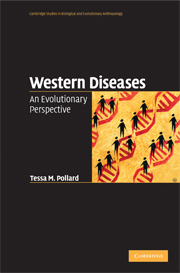Book contents
- Frontmatter
- Contents
- Preface
- 1 Introduction
- 2 An evolutionary history of human disease
- 3 Obesity, type 2 diabetes and cardiovascular disease
- 4 The thrifty genotype versus thrifty phenotype debate: efforts to explain between population variation in rates of type 2 diabetes and cardiovascular disease
- 5 Reproductive cancers
- 6 Reproductive function, breastfeeding and the menopause
- 7 Asthma and allergic disease
- 8 Depression and stress
- 9 Conclusion
- References
- Index
8 - Depression and stress
Published online by Cambridge University Press: 05 June 2012
- Frontmatter
- Contents
- Preface
- 1 Introduction
- 2 An evolutionary history of human disease
- 3 Obesity, type 2 diabetes and cardiovascular disease
- 4 The thrifty genotype versus thrifty phenotype debate: efforts to explain between population variation in rates of type 2 diabetes and cardiovascular disease
- 5 Reproductive cancers
- 6 Reproductive function, breastfeeding and the menopause
- 7 Asthma and allergic disease
- 8 Depression and stress
- 9 Conclusion
- References
- Index
Summary
Many researchers and lay members of society have expressed, or can identify with, the view that the modern western lifestyle does not nurture good mental health. The biggest foci of concern are depression and stress, both identified as increasingly important causes of ill health around the world, particularly in western societies.
According to biomedicine, depression can be an emotion, a symptom, or a disease. Lesser feelings of depression form part of the normal range of emotional experience, while clinical depression is classified as a psychiatric illness. Rates of diagnosed clinical depression have increased in the United States, Sweden, Germany, Canada and New Zealand since the Second World War and there appears to have been a decrease in the average age of onset of depression (Klerman and Weissman 1989). Projections suggest that depression is likely to be only second in importance to coronary heart disease as a cause of ill health worldwide by 2020 (Murray and Lopez 1997) and to maintain that position in 2030 (Mathers and Loncar 2006).
When people talk about being stressed, they usually mean that they are struggling to cope with the demands being made of them, and this is also the sense in which the term stress is now most often used by academics. There is a shared notion that people living in affluent industrialised societies live increasingly stressful lives, working long hours, undertaking long commutes, juggling the demands of work and family, struggling to find time for exercise, and suffering from ill health as a consequence, and that this kind of life generates more stress and stress-related disease than humans have ever felt before.
- Type
- Chapter
- Information
- Western DiseasesAn Evolutionary Perspective, pp. 136 - 152Publisher: Cambridge University PressPrint publication year: 2008



